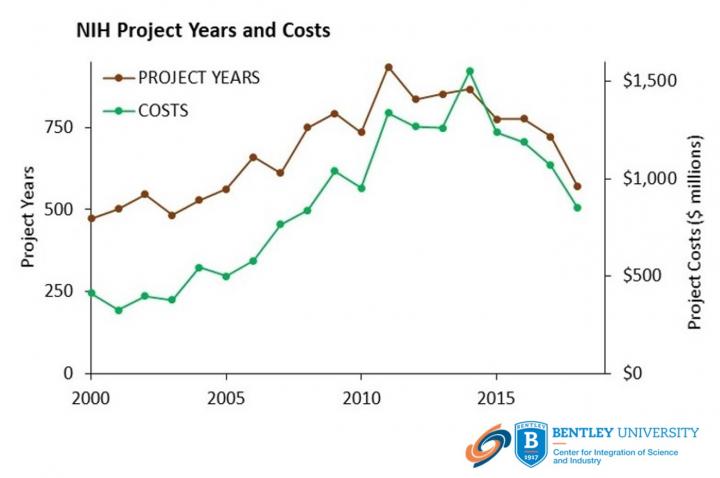Broad foundation of NIH-funded research for enabling technologies prior to pandemic provided a tool kit for rapid development of COVID vaccines

Credit: © Center for Integration of Science and Industry at Bentley University
The unprecedented development of COVID-19 vaccines less than a year after discovery of this virus was enabled by more than $17 billion of research on vaccine technologies funded by the NIH prior to the pandemic, according to new research from Bentley University’s Center for Integration of Science and Industry. The article, titled “NIH funding for vaccine readiness before the COVID-19 pandemic,” demonstrates the critical role this broad foundation of government-funded research plays in ensuring vaccine readiness.
The report, published today in the journal Vaccine, examined the maturation of research and NIH funding for ten technologies that were applied in candidate COVID-19 vaccines as of July 2020. The maturation of these technologies was described in 51,530 published research papers from 2000-2019, of which 8,420 (16%) acknowledge NIH funding totaling $17.2 billion. Some of these technologies have been employed successfully in vaccines since the mid-20th century. Others, such as the viral vectors employed in the Johnson & Johnson and AstraZeneca vaccines, emerged from genetic engineering in the 1980s, and were found to be established prior to 2010. Still others, including the mRNA technologies employed by Pfizer/BioNTech and Moderna, only recently reached an established point.
“Rapid development of COVID vaccines was only possible because companies had access to a tool kit of established technologies,” said Dr. Fred Ledley, Director of the Center for Integration of Science and Industry. “Some of the most recent technologies, including mRNA and viral vectors, proved to be particularly suitable for COVID-19 and the timelines required to combat this pandemic. The substantial public sector investments over the past 20 years that went into the maturation of these technologies needs to be considered in the pricing of these products and their availability to the public.”
“This study also found surprisingly little NIH-funded, published research on vaccines for recognized pandemic threats, such as coronavirus, Zika, Ebola, or dengue virus,” said Dr. Anthony Kiszewski, lead author of the study and Associate Professor of Natural & Applied Science at Bentley University. “Mechanisms need to be developed for funding research on vaccine technologies that accelerate vaccine development against emergent threats and preempt future pandemics.”
###
Dr. Anthony Kiszewski was the lead author on this work along with Dr. Ekaterina Galkina Cleary, Dr. Matthew Jackson and Dr. Fred Ledley. This work was supported by a grant from the National Biomedical Research Foundation.
“NIH funding for vaccine readiness before the COVID-19 pandemic” DOI: https:/
THE CENTER FOR INTEGRATION OF SCIENCE AND INDUSTRY at Bentley University focuses on advancing the translation of scientific discoveries to create public value. The Center is an environment for thought leadership and interdisciplinary scholarship spanning basic science, data analytics, business and public policy. For more information, visit http://www.
BENTLEY UNIVERSITY is more than just one of the nation’s top business schools. It is a lifelong-learning community that creates successful leaders who make business a force for positive change. With a combination of business and the arts and sciences and a flexible, personalized approach to education, Bentley provides students with critical thinking and practical skills that prepare them to lead successful, rewarding careers. Founded in 1917, the university enrolls 4,200 undergraduate and 1,000 graduate and PhD students and is set on 163 acres in Waltham, Massachusetts, 10 miles west of Boston. For more information, visit bentley.edu. Follow us on Twitter @BentleyU #BentleyUResearch.
About Vaccine
Vaccine is the pre-eminent journal for those interested in vaccines and vaccination. It is the official journal of The Edward Jenner Society and The Japanese Society for Vaccinology and is published by Elsevier http://www.
Media Contact: Helen Henrichs, [email protected], 781-891-2277
For news media only:
Corresponding author: Dr. Fred D. Ledley, Director, Center for Integration of Science and Industry, Bentley University, Waltham, MA. Tel: 781.891.2046; email: [email protected]
Media Contact
Helen Henrichs
[email protected]
Original Source
https:/
Related Journal Article
http://dx.




